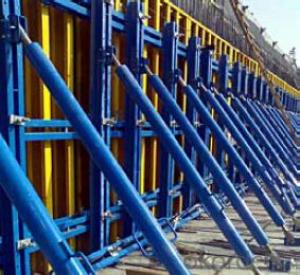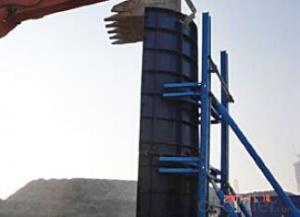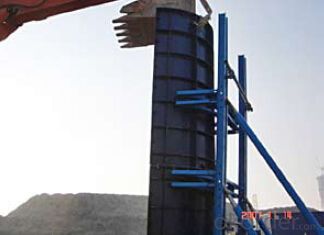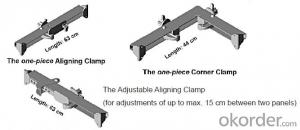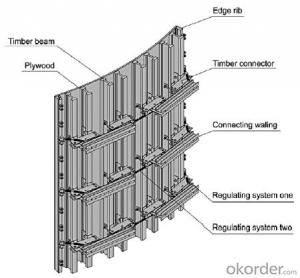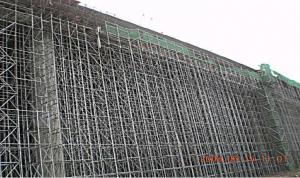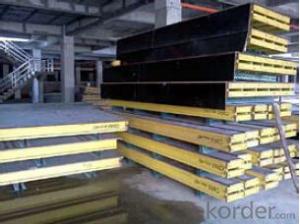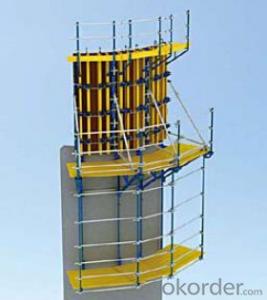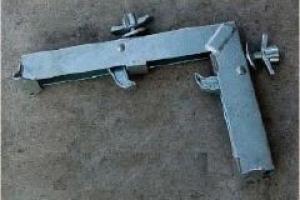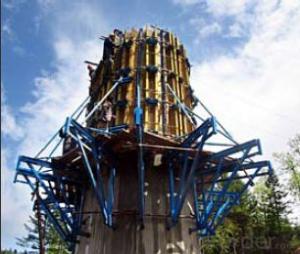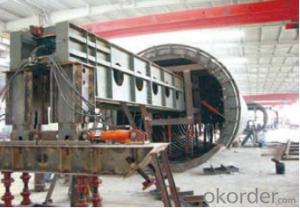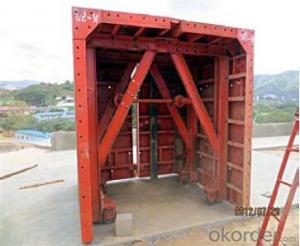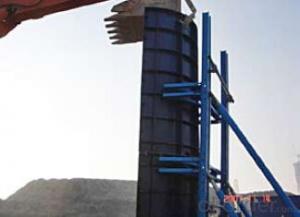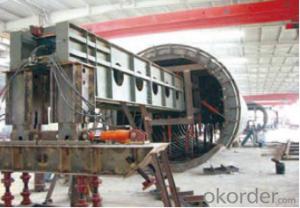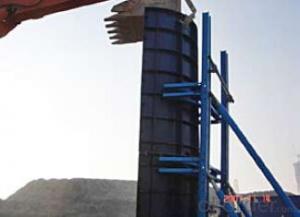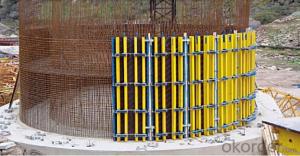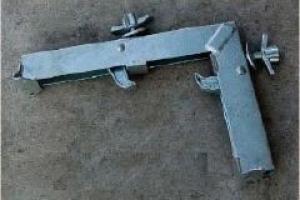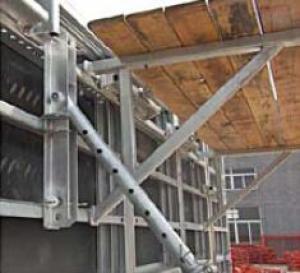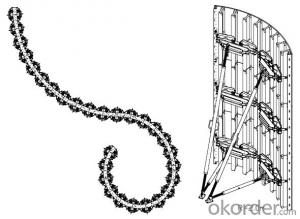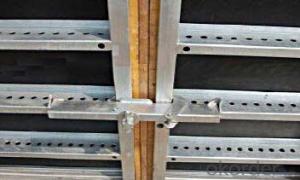Tunnel formwork system and scaffolding system
- Loading Port:
- Tianjin
- Payment Terms:
- TT OR LC
- Min Order Qty:
- 50 m²
- Supply Capability:
- 1000 m²/month
OKorder Service Pledge
Quality Product, Order Online Tracking, Timely Delivery
OKorder Financial Service
Credit Rating, Credit Services, Credit Purchasing
You Might Also Like
Building Bridge&Tunnel Formwork:
A compositional steel formwork system mainly used in the building which has regular structure
without beams, the excellent formwork system can make the integral pouring for the wall & slab
easily achieved.
Characteristics:
◆ No assembling, easy operation with formed formwork.
◆ High stiffness, make perfect shape for concrete.
◆ Repeatedly turnover is available.
◆ Widely applied range, such as building, bridge, tunnel, etc.
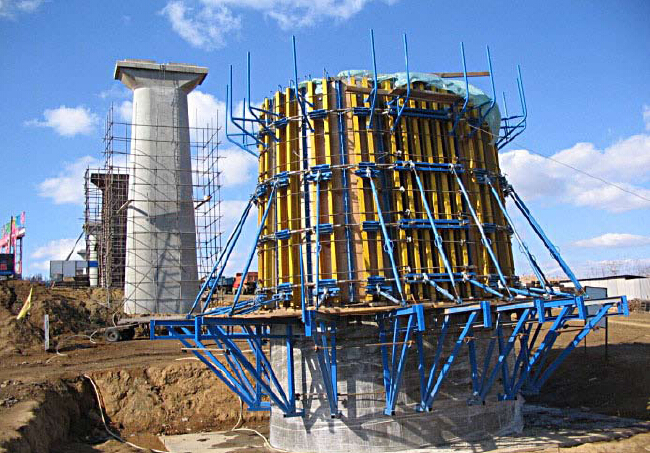
- Q: What are the considerations when selecting the size and spacing of steel formwork panels?
- Several important considerations need to be made when choosing the size and spacing of steel formwork panels. To begin with, the specific requirements of the project should dictate the size of the panels. Factors like the dimensions and shape of the concrete structure being formed, as well as the load-bearing capacity of the panels, must be taken into account. Selecting panel sizes that can adequately support the weight of the concrete and any additional loads during construction is crucial. The spacing of the steel formwork panels is another crucial factor to consider. It should be determined based on the desired concrete thickness and the panels' ability to resist deflection or bending under the concrete's weight. The spacing should be close enough to prevent excessive sagging or bulging of the panels, which could result in an uneven concrete surface. Moreover, the spacing should allow for easy installation, removal, and handling of the formwork panels. This is especially important for efficient and cost-effective construction processes. Sufficient spacing between the panels will enable smooth and safe placement and removal of the formwork, reducing the risk of accidents or delays. Additionally, the spacing should also consider the size and accessibility requirements for construction equipment and workers. Ample space between the panels will allow for the movement and operation of equipment, such as cranes or concrete pumps, and ensure that workers can safely and efficiently access the formwork to complete their tasks. In conclusion, carefully considering the size and spacing of steel formwork panels is essential to ensure the structural integrity of the concrete structure and the safety and efficiency of the construction process. It is advisable to consult experienced professionals or engineers to determine the most suitable panel sizes and spacing for each specific project.
- Q: What are the common safety precautions when working with steel formwork?
- Some common safety precautions when working with steel formwork include wearing appropriate personal protective equipment (PPE) such as hard hats, safety glasses, gloves, and steel-toe boots. It is also important to ensure that the formwork is properly secured and braced to prevent collapse or movement. Regular inspections should be conducted to identify any defects or weaknesses in the formwork. Additionally, workers should receive proper training on how to safely assemble, disassemble, and handle the steel formwork to avoid any potential injuries.
- Q: Can steel formwork be easily transported to different job sites?
- Indeed, steel formwork can effortlessly be transported to various worksites. Renowned for its sturdiness and robustness, steel formwork is ideal for repeated utilization and convenient transportation. It can be dismantled and reassembled without compromising its structural soundness, enabling effortless transportation to diverse destinations. Furthermore, unlike alternative formwork types, steel formwork is lightweight, rendering it more manageable to handle and transport using conventional construction machinery or vehicles. The adaptability and portability of steel formwork render it an esteemed preference for construction ventures necessitating frequent relocation between worksites.
- Q: What are the considerations when designing steel formwork for beams?
- Several important considerations need to be taken into account when designing steel formwork for beams. Firstly, it is necessary to determine the load capacity of the formwork to ensure that it can withstand the weight of the concrete being poured. This involves considering the weight of the wet concrete, any additional loads during construction, as well as the weight of workers and equipment on the formwork. The dimensions and shape of the beams also need to be considered. The formwork should be able to accommodate the specific dimensions and shape of the beams, ensuring accurate pouring of the concrete and meeting the required specifications. This may involve creating custom formwork for unique beam shapes or using adjustable formwork for beams with varying dimensions. The construction process should also be considered when designing steel formwork for beams. It is important to determine how the formwork will be assembled and disassembled, as well as how it will be supported during concrete pouring and curing. Additional support structures or scaffolding may be necessary to ensure stability and security during the construction process. Furthermore, the ease of use and accessibility of the formwork should be considered. Designing formwork that is easy to assemble and disassemble, as well as providing easy access to the beams during construction, can greatly improve efficiency and safety. Lastly, the durability and reusability of the formwork should be taken into account. Steel formwork is often chosen for its ability to be reused multiple times, reducing waste and cost. Designing the formwork to withstand the demands of construction and ensuring easy cleaning and maintenance will prolong its lifespan and make it more cost-effective in the long run. In conclusion, designing steel formwork for beams requires careful consideration of load capacity, dimensions and shape, construction process, ease of use and accessibility, and durability and reusability. By considering these factors, a well-designed formwork system can be created to ensure successful beam construction.
- Q: How long does it take to set up steel formwork?
- The time required to set up steel formwork varies depending on several factors. These factors include the complexity of the structure, the level of experience and skill of the workers, the size of the project, and the availability of equipment. In general, the setup of steel formwork can take anywhere from a few hours to several days. For smaller projects with simple structures, a team of experienced workers can usually complete the formwork setup within a day or two. This involves tasks like measuring and marking the layout, assembling the steel panels, beams, and props, and securing them in place. Additionally, braces and ties may be attached to ensure stability and alignment. On the other hand, larger and more intricate projects may require more time for formwork setup. These projects may include complex designs, multiple levels or floors, and a greater number of formwork components. In such cases, the setup process may take several days or even weeks, depending on the size of the team and the availability of resources. It is worth noting that although steel formwork may take longer to set up compared to other types of formwork like timber or plastic, it offers advantages such as durability, reusability, and enhanced stability. These benefits outweigh the additional time required for setup, particularly for large-scale construction projects that necessitate robust and dependable formwork systems.
- Q: How does steel formwork impact the overall project execution?
- Steel formwork can have a significant impact on the overall project execution. Its strength and durability make it an ideal choice for construction projects, allowing for faster and more efficient work. Steel formwork also provides accurate and precise results, ensuring that the structures are built according to the desired specifications. Additionally, steel formwork is reusable, reducing the overall project costs and minimizing environmental impact. Overall, steel formwork enhances the efficiency, quality, and cost-effectiveness of the project execution.
- Q: Can steel formwork be used for precast concrete elements?
- Yes, steel formwork can be used for precast concrete elements. Steel formwork provides durability and strength, making it suitable for manufacturing precast concrete elements. It allows for precise shaping and accurate dimensions, ensuring high-quality and consistent results. Additionally, steel formwork can be easily reused, making it a cost-effective option for precast concrete production.
- Q: How does steel formwork contribute to better site organization?
- Steel formwork contributes to better site organization by providing a durable and reusable system for creating concrete structures. Its accuracy, strength, and ease of assembly allow for efficient and precise construction, reducing the need for on-site adjustments or modifications. This results in a well-organized and streamlined construction process, saving time and resources. Additionally, steel formwork's versatility enables the creation of complex shapes and designs, enhancing the aesthetic appeal of the site.
- Q: Is steel formwork suitable for projects with high concrete strength requirements?
- Yes, steel formwork is suitable for projects with high concrete strength requirements. Steel formwork is known for its high strength and durability, making it ideal for projects that require high concrete strength. It can withstand the pressure and weight of the concrete, ensuring that it maintains its shape and stability during the pouring and curing process. Additionally, steel formwork provides a smooth and uniform finish to the concrete, which is important for achieving high strength and quality in the final product. Moreover, steel formwork can be easily reused multiple times, making it a cost-effective option for projects with high concrete strength requirements.
- Q: What are the considerations when designing steel formwork for architectural facades?
- When designing steel formwork for architectural facades, several considerations need to be taken into account. Firstly, the structural integrity of the formwork is crucial to ensure it can withstand the weight of the concrete and any external forces. The formwork should be designed to support the desired shape and size of the facade while maintaining its stability. Additionally, the aesthetics of the facade play a significant role in the design process. The formwork should be able to create the desired texture, patterns, and finishes on the concrete surface, ensuring a visually appealing outcome. This may involve incorporating decorative elements, such as molds or inserts, into the formwork design. Another consideration is ease of assembly and disassembly. The formwork should be designed in a way that allows for efficient installation and removal, minimizing construction time and costs. It should also be adjustable to accommodate changes in design or modifications during the construction process. Durability is also an important factor. Steel formwork should be resistant to corrosion and wear, ensuring its longevity and reducing maintenance requirements. The material chosen for the formwork should be compatible with the concrete mix used to prevent any chemical reactions that could compromise the structural integrity or aesthetics of the facade. Lastly, safety is a key consideration when designing steel formwork. Adequate measures should be taken to ensure the formwork can withstand the loads and forces during construction, preventing any accidents or failures. This may involve incorporating additional bracing or reinforcement to enhance its stability and strength. Overall, a successful design of steel formwork for architectural facades requires a balance between structural integrity, aesthetics, ease of assembly, durability, and safety.
Send your message to us
Tunnel formwork system and scaffolding system
- Loading Port:
- Tianjin
- Payment Terms:
- TT OR LC
- Min Order Qty:
- 50 m²
- Supply Capability:
- 1000 m²/month
OKorder Service Pledge
Quality Product, Order Online Tracking, Timely Delivery
OKorder Financial Service
Credit Rating, Credit Services, Credit Purchasing
Similar products
Hot products
Hot Searches
Related keywords
